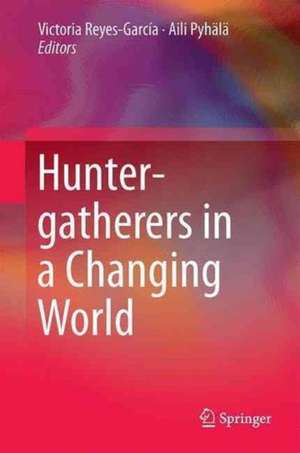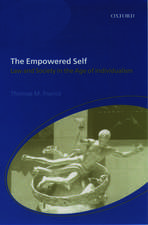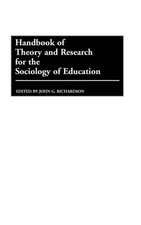Hunter-gatherers in a Changing World
Editat de Victoria Reyes-García, Aili Pyhäläen Limba Engleză Hardback – 25 noi 2016
Far from the commonly held romantic view that hunter-gatherers continue to exist as isolated populations living a traditional lifestyle in harmony with the environment, contemporary hunter-gatherers – like many rural communities around the world - face a number of relatively new ecological and social challenges to which they are pressed to adapt. Contemporary hunter-gatherer societies are increasingly and rapidly being affected by Global Changes, related both to biophysical Earth systems (i.e., changes in climate, biodiversity and natural resources, and water availability), and to social systems (i.e. demographic transitions, sedentarisation, integration into the market economy, and all the socio-cultural change that these and other factors trigger).
Chapter 10 of this book is open access under a CC BY 4.0 license.
| Toate formatele și edițiile | Preț | Express |
|---|---|---|
| Paperback (1) | 478.01 lei 38-44 zile | |
| Springer International Publishing – 6 iul 2018 | 478.01 lei 38-44 zile | |
| Hardback (1) | 498.72 lei 38-44 zile | |
| Springer International Publishing – 25 noi 2016 | 498.72 lei 38-44 zile |
Preț: 498.72 lei
Preț vechi: 623.40 lei
-20% Nou
Puncte Express: 748
Preț estimativ în valută:
95.43€ • 103.98$ • 80.41£
95.43€ • 103.98$ • 80.41£
Carte tipărită la comandă
Livrare economică 19-25 aprilie
Preluare comenzi: 021 569.72.76
Specificații
ISBN-13: 9783319422695
ISBN-10: 3319422693
Pagini: 150
Ilustrații: XXXVIII, 257 p. 1 illus.
Dimensiuni: 155 x 235 x 21 mm
Greutate: 0.7 kg
Ediția:1st ed. 2017
Editura: Springer International Publishing
Colecția Springer
Locul publicării:Cham, Switzerland
ISBN-10: 3319422693
Pagini: 150
Ilustrații: XXXVIII, 257 p. 1 illus.
Dimensiuni: 155 x 235 x 21 mm
Greutate: 0.7 kg
Ediția:1st ed. 2017
Editura: Springer International Publishing
Colecția Springer
Locul publicării:Cham, Switzerland
Cuprins
Introduction: Hunter-Gatherers in a Fast Changing World.- Part I: The Historical Legacy.- 1. The Fortunes of Foragers in Colonial and Post-Colonial New Guinea.- 2. When is a Foraging Society? The Loplik in the Tarim Basin.- Part II: Environmental Change.- 3. Trailing Forest Uses Among the Punan Tubu of North Kalimantan, Indonesia.- 4. Bushmeat Crisis, Forestry Reforms and Contemporary Hunting Among Central African Forest Hunters.- 5. Defaunation Through the Eyes of the Tsimane’.- 6. The Death of the Chief of Peccaries: The Apurinã and the Scarcity of Forest Resources in Brazilian Amazonia.- Part III: Changes in Economic, Political and Legal Systems.- 7. Why Pumé Foragers Retain a Hunting and Gathering Way of Life on a Transitional Landscape.- 8. Sharing in a Context of Rural Development. A Study Among a Contemporary Hunter-Gatherer Society in Indonesia.- 9. Hunter-Gatherers and Fishing Rights in Alaska and Siberia: Contemporary Governmentality, Subsistence, and Sustainable Enterprises.- Part IV: Globalization and Cultural Change.- 10. Indigenous Networks and Evangelical Frontiers: Problems with Governance Ethics in Cases of ‘Voluntary Isolation’ in Contemporary Amazonia.- 11. 'Like Father, Like Son'? Baka Children’s Local Ecological Knowledge Learning in a Context of Cultural Change.- 12. Persistence and Change in Infant Care among Aka Foragers.- 13. Globalized Conflicts, Globalized Responses. Changing Manners of Contestation Among Indigenous Communities.
Recenzii
“The contents of the book are therefore quite broad and extensive, contemporary hunter-gatherer communities are extensively analyzed not only from the point of view of the historical but also the changing environment, national economies or legal systems. … the book describes the hunting-gathering community selectively on a global scale and, in particular, that it examines their current state or their development in the present. Individual chapters are very clearly structured, and have up-to-date citations.” (Zdeňka Nerudová, Anthropologie, Issue 3, 2017)
Notă biografică
Aili Pyhälä (PhD in Development Studies, 2003, University of East Anglia) is a Senior Researcher and Lecturer at the University of Helsinki. After years of working and living with indigenous peoples in Amazonia and Africa and gaining direct experience working with local communities, participatory processes, and social and environmental justice, she now pursues her research interests in indigenous peoples’ knowledge and rights, alternative education, conservation psychology, global responsibility, human-nature relations, and cross-cultural notions of wellbeing. She has researched and worked with a number of sustainability and wellbeing indicators, and has close to 20 years of experience evaluating development cooperation projects worldwide. A trained permaculturist, fluent in 8 languages, and with professional experience in 25 countries, she enjoys teaching, facilitating events, and promoting cross-cultural communication and exchange.
Victoria Reyes-García (PhD in Anthropology, 2001, U. of Florida) is ICREA Research Professor at the Environmental Science and Technology Institute, Universitat Autònoma de Barcelona. Her research addresses the benefits generated by local ecological knowledge and the drivers of change of this type of knowledge. Reyes-García has worked in international research projects since 1996. She lived among the Tsimane', a hunter-gatherer society in the Amazon, from 1999 until 2004. She has experience in multidisciplinary research, working with anthropologists, agronomists, biologists, economists, archaeologists, and computer scientists. Since April 2006 she coordinates the Ethnoecology Laboratory, which catalyses projects studying the dynamic relations among people, biota, and environments. She has more than 100 publications in peer-reviewed journals. In 2010 she received a Starting Grant from the European Research Council to study the adaptive nature of local ecological knowledge using a cross-cultural comparative approach.
Victoria Reyes-García (PhD in Anthropology, 2001, U. of Florida) is ICREA Research Professor at the Environmental Science and Technology Institute, Universitat Autònoma de Barcelona. Her research addresses the benefits generated by local ecological knowledge and the drivers of change of this type of knowledge. Reyes-García has worked in international research projects since 1996. She lived among the Tsimane', a hunter-gatherer society in the Amazon, from 1999 until 2004. She has experience in multidisciplinary research, working with anthropologists, agronomists, biologists, economists, archaeologists, and computer scientists. Since April 2006 she coordinates the Ethnoecology Laboratory, which catalyses projects studying the dynamic relations among people, biota, and environments. She has more than 100 publications in peer-reviewed journals. In 2010 she received a Starting Grant from the European Research Council to study the adaptive nature of local ecological knowledge using a cross-cultural comparative approach.
Textul de pe ultima copertă
This book compiles a collection of case studies analysing drivers of and responses to change amongst contemporary hunter-gatherers. Contemporary hunter-gatherers’ livelihoods are examined from perspectives ranging from historical legacy to environmental change, and from changes in national economic, political and legal systems to more broad-scale and universal notions of globalization and acculturation.
Far from the commonly held romantic view that hunter-gatherers continue to exist as isolated populations living a traditional lifestyle in harmony with the environment, contemporary hunter-gatherers – like many rural communities around the world - face a number of relatively new ecological and social challenges to which they are pressed to adapt. Contemporary hunter-gatherer societies are increasingly and rapidly being affected by Global Changes, related both to biophysical Earth systems (i.e., changes in climate, biodiversity and natural resources, and water availability), and to social systems (i.e. demographic transitions, sedentarisation, integration into the market economy, and all the socio-cultural change that these and other factors trigger).
Far from the commonly held romantic view that hunter-gatherers continue to exist as isolated populations living a traditional lifestyle in harmony with the environment, contemporary hunter-gatherers – like many rural communities around the world - face a number of relatively new ecological and social challenges to which they are pressed to adapt. Contemporary hunter-gatherer societies are increasingly and rapidly being affected by Global Changes, related both to biophysical Earth systems (i.e., changes in climate, biodiversity and natural resources, and water availability), and to social systems (i.e. demographic transitions, sedentarisation, integration into the market economy, and all the socio-cultural change that these and other factors trigger).
Caracteristici
Re-examines the definition of hunter-gatherers based on numerous case studies Analyzes multiple drivers of change affecting contemporary hunter-gatherers Describes contemporary changes in livelihood of groups who lived as foragers until recently Addresses the interconnectedness of the environmental, economic, social, and political systems in impacting foragers’ livelihoods












